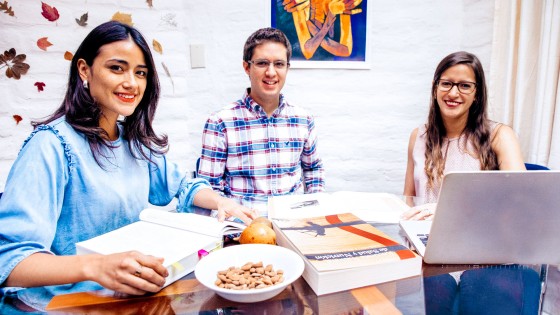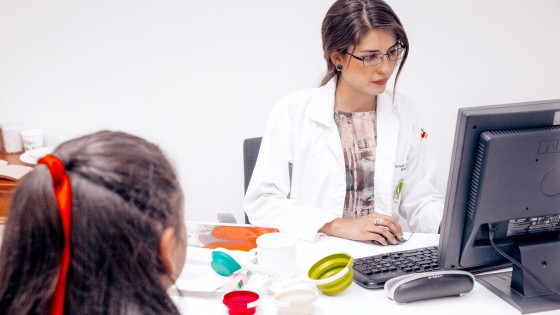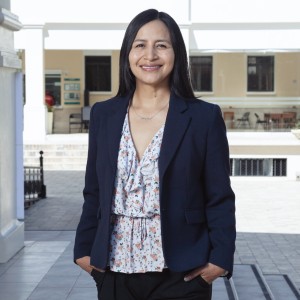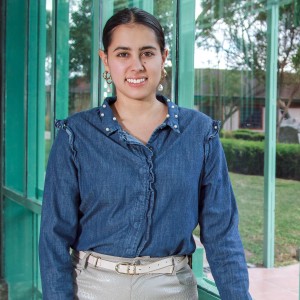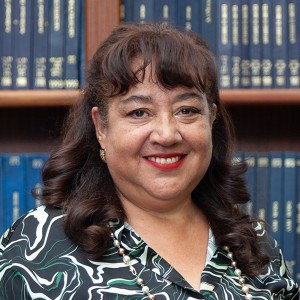Nutrition and Dietetics
"We provide tools to improve health and promote healthy lifestyles"
Nutrition and Dietetics
The Nutrition and Dietetics program is based on the study of food and nutrition, focusing on health promotion and prevention and disease recovery. Throughout the course, the science of nutrition and dietetics is analyzed, interpreted, and applied at the individual and/or collective level, in all sectors of the population, in healthy and sick individuals, in order to treat food and nutrition-related diseases in a timely manner. Nutrition and Dietetics students will be trained to carry out food and nutrition interventions, nutritional counseling and education, plan and execute community programs, manage and administer food services, and carry out research.
Advantages
- Beginning during the program's second year, there are field trips that promote learning how to manage the theory studied in the classroom, with a closer approach to the patient in recent years.
- Exchanges with the best US universities that allow for witnessing the different behaviors of cultures in the nutritional field. This is where our students have stood out with their participation, managing to work with health teams in childhood obesity prevention.
- The program includes a teaching University Hospital (Hospital de los Valles) and an ambulatory care clinic (SIME), for pre-professional practices during the course of the program.
- Agreement with Zonal Health Coordination 9 which allows clinical practices in Public Hospitals such as the Pablo Arturo Suarez Hospital and community practices with the Yaruquí Health Center.
- Agreements with children's centers, schools, and nursing homes for practices in evaluating nutritional status.
- Agreement with Independiente del Valle Soccer team that allows sports internships.
- Participation in career linking projects focused on the elderly.
- Equipment and appropriate technology for the nutritional management of patients in all age groups.
- Outstanding graduates in different fields:
- Sports: Ecuador's First Guinness Sports Record, ‘From the Center of the Earth to the Sun.' Being part of the multidisciplinary work team of Millán Ludeña.
- Entrepreneurship: "The Health Bag" home food delivery service covering the nutritional needs of customers.
- Academic: More than 80% of the graduates have completed or are participating in graduate programs focused on different areas such as Sports, Clinics, Public Health, Metabolism, Nutrigenomics, Food, Anthropology, etc. in universities around the world: Mexico, Brazil, Spain, Portugal, Germany, the United States, Canada.
- The Nutrition and Dietetics program constantly develops refresher courses and specialized conferences aimed at professionals in the area of nutrition and general health.
- The professors in the program have a high level of research and joint work with national and international universities and institutions.
-
Presentations have been highlighted at different national and international conferences; ESPEN 2019 Congress, European Society for Clinical Nutrition and Metabolism.
-
Publication of the first Photographic Atlas of portions of Food for the Ecuadorian Population 2019.
Professional profile
-
The Nutritionist trained at the USFQ College of Health Sciences will obtain solid knowledge in the basic, social, and nutrition sciences, with individual and collective responsibility behavior in the fields of Nutrition and Dietetics.
-
The basic and specialized training in nutritional care, food-nutrition education, participatory community intervention, planning, organization, control, and evaluation of food services and health programs will help students diagnose the food and nutritional situation of individuals and communities, applying their scientific knowledge through research and using their skills in search of concrete and effective solutions to diagnose problems. Additionally, students will be able to demonstrate professional sensitivity to social inequity that impacts the nutritional conditions of vulnerable populations and act according to ethical and moral principles in the personal, social, and professional fields.
-
The student who completes this program will be a professional with flexibility and efficiency, able to work in a multidisciplinary team, that will allow them to insert themselves into a competitive and globalized world, with cultural strength, so that they can autonomously advance their personal and collective development as human beings and participate through their skills as an agent of development.
-
They will be critical of their knowledge and capable of evaluating and identifying opportunities for improvement in their professional field and will communicate their knowledge using effective communication mechanisms, both to the scientific community, as well as to the individuals and people in their environment.
-
In the health sector, the nutritionist deals with the treatment, recovery, and rehabilitation of the health of users at different stages of the life cycle in Hospital Centers of low, medium, and high complexity, taking into account the physiological needs (or pathological if such is the case), personal, socioeconomic, religious, and cultural preferences. They work in areas of medical care (adult and pediatric hospitals).
-
In the area of institutional feeding, nutrition and dietetic professionals will be trained to administer collective feeding services.
-
Within the food industry, nutrition and dietetics professionals will carry out technical and nutritional advice, communication, nutrition education, and social marketing.
-
In the public health area, they encompass all activities related to health and disease, the sanitary and ecological status of the living environment; the organization and operation of health, planning, management and education services (WHO). They will carry out functions such as project planning, program evaluation, and providing nutritional education services to improve disease prevention and promote general health. They will provide nutritional counseling and coaching, education, prevention, and nutrition education for children, adolescents, and adults at the community level.
Career field
The graduate of the Nutrition and Dietetics program is capable of being employed as a qualified professional in areas such as:
- Research centers in Nutrition, Health, and Food.
- Public institutions: Ministry of Public Health, Ministry of Economic and Social Inclusion, Ministry of Education, Coordinating Ministry of Social Development, Ministry of Sports, Primary Health Care Centers.
- Private institutions: Hospitals, Clinics, and Health Centers.
- Non-Governmental Organizations (NGOs).
- Community Nutrition: Schools, children's centers, nursing homes, schools, Universities.
- Food Services Administration.
- Food industry.
- Nutrition and Sports.
- Private Consultation/Nutritional Counseling.
- The skills that a nutritionist develops will be to intervene in the diet of a person or group, from the following areas of action: nutrition in health as well as in disease, dietary advice, research and teaching, public health from government agencies, companies in the food sector, and collective and social food.
Testimonials
"For me, the most important element of success and well-being is balance in all areas of life. In the study of nutrition and its application, I discovered that the only way to have a healthy lifestyle and maintain it is through balance and now I follow this path to help people find well-being. In Ecuador, a lot of help is still needed and that is why I chose the University of San Francisco de Quito, where I learn from excellent professionals who guide me to generate a positive impact in my country, as well as assisting me in my personal formation as a complete human being.”
- Camila Ruales, Student -
“Studying Nutrition and Dietetics at USFQ prepared me to be a complete professional since it gave me the opportunity to learn about the multiple roles that a nutritionist must fulfill. This was all thanks to the experience and human quality of the teachers who taught me everything I needed to know about nutrition and health. This allowed me to specialize in an area that I am passionate about and face academic and professional challenges with the full confidence that my training at USFQ gave me the necessary tools and knowledge.”
- María Belen Ocampo, MPH, RD. Alumni -
“Working in what you like is one of the greatest goals of the human being. Teaching is my passion, exchanging knowledge and interacting with young people is a job that I enjoy every day. Teaching at USFQ allows me to fulfill my greatest aspirations in an environment that encourages you to work and, above all, to teach freely. The first thing I learned here is that our professionals must be steeped not only in knowledge but also in values, and that is the greatest challenge we can have as teachers. I can say that I achieved my goal, I work in what I like, and in the place that I love.”
- Andrea Román, MD, MSc. Professor -
“My childhood dream was to help people be healthy and I couldn't find a better way to do it than through nutrition. When we see how food saves our life, everything changes. Having the opportunity to learn and prepare with the best professionals is something wonderful since each of the teachers is specialized in their respective areas. Practices in hospitals, communities, and health centers allow us to take a closer look at the reality of our country, to know the tastes of people, their needs, and dreams, while we are closer to fulfilling ours every day. ”
- Doménica Núñez, Student -
“USFQ opened my doors to always seek to be better, to participate in exchanges, to follow a graduate degree, to work in different areas of Nutrition, until I finally became the coordinator for the Nutrition and Dietetics program at the Escuela Superior Politécnica del Litoral (ESPOL) in Guayaquil, thus contributing a grain of sand to the knowledge of the profession from a scientific point of view.”
- Gabriela Cucalon, MSc. Alumni -
Academic Faculty

